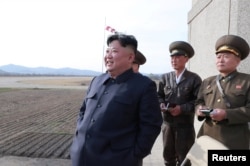North Korea said it no longer wanted to deal with U.S. Secretary of State Mike Pompeo in talks over its nuclear weapons program. The comment by a foreign ministry official came a few hours after the country announced the test of what it called a new “tactical” weapon.
The North’s official KCNA news agency said foreign ministry official Kwon Jong Gun made the comment about Pompeo. Kwon said that no one could predict what may happen if the United States did not stop the “root cause” that made North Korea develop nuclear weapons.
Hours earlier, North Korea announced that leader Kim Jong Un had watched the testing of a new tactical guided weapon. KCNA said the weapon has a special way of guiding flight and “a powerful warhead.”
It was the North’s first weapon test since the February talks between Kim and U.S. President Donald Trump in Vietnam. Those talks ended without an agreement. North Korea wanted the U.S. to reduce sanctions in some way while the U.S wanted North Korea to move forward to end its nuclear program.
North Korea gave no details on the weapon that was tested on Wednesday. The word “tactical” usually describes a short-range weapon rather than a long-range missile that could threaten the U.S.
KCNA said that Kwon, who heads U.S. affairs, said the Vietnam meeting showed that talks could go wrong when Pompeo takes part. Kwon said another meeting would not be successful with Pompeo there. In any future U.S.-North Korea talks, Kwon asked that someone take Pompeo's place.
“I wish our dialogue counterpart would be not Pompeo but [an]other person who is more careful and mature in communicating with us.”
A spokeswoman for the U.S. State Department said officials knew about the report and added that the U.S. is ready to take part in productive talks with North Korea.
Kwon did not explain more about why North Korea was being forced to develop nuclear weapons. North Korea has for many years said it needs to defend itself from what it considers U.S. aggression.
Last week, Kim Jong Un said the failure of the talks could cause new problems between the two countries. He said the U.S. must change its methods by the end of the year.
However, Trump says he has a good relationship with Kim.
Kwon also said the two leaders were on good terms. At the same time, he criticized Pompeo for telling untrue stories to get attention. He did not explain.
Kwon said Pompeo had said things to dishonor North Korea's leader. Last week, Pompeo agreed to the naming of Kim as a “tyrant” at a U.S. congressional hearing.
Not all Kim's weapons are nuclear
Kim Dong-yub is a military expert at Kyungnam University’s Institute of Far Eastern Studies in Seoul. He said the newly tested weapon was likely a cruise missile that could be launched from the ground, sea or air.
Harry Kazianis works with the Center for the National Interest in Washington. He said, “Chairman Kim Jong Un never promised to stop testing all weapons in his military arsenal." Last April, Kim said that he would stop nuclear tests and launches of intercontinental ballistic missiles (ICBMs). They are long-range missiles that could reach the U.S.
U.S. forces did not see a missile launch from North Korea.
I’m Jill Robbins.
Joyce Lee and Hyonhee Shin reported on this story for Reuters. Jill Robbins adapted it for Learning English. Mario Ritter was the editor.
What do you think of the latest actions of North Korea? We want to hear from you. Write to us in the Comments Section.
____________________________________________________________________
Words in This Story
weapon - n. something (such as a gun, knife, club, or bomb) that is used for fighting or attacking someone or for defending yourself when someone is attacking you
tactical – n. relating to military operations that are smaller in scale and play a part in a larger plan
warhead - n. the part of a missile that contains the explosive
sanction - n. (usually plural) an action that is taken or an order that is given to force a country to obey international laws by limiting or stopping trade with that country, by not allowing economic aid for that country
dialogue - n. a discussion or series of discussions that two groups or countries have in order to end a disagreement
mature - adj. having or showing the mental and emotional qualities of an adult
tyrant - n. a ruler who has complete power over a country and who is cruel and unfair
cruise missile - n. a large military weapon that flies close to the ground and is directed to a specific place to explode
arsenal - n. a collection of weapons






